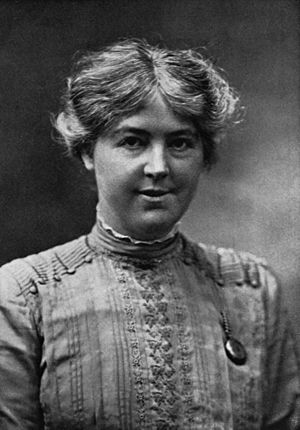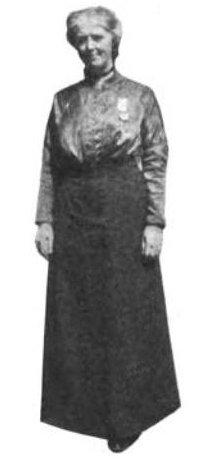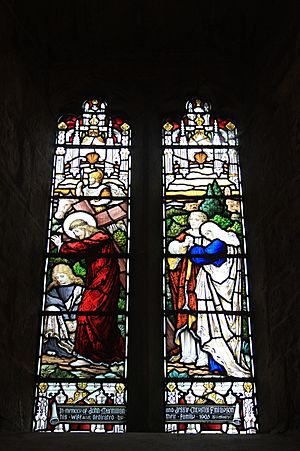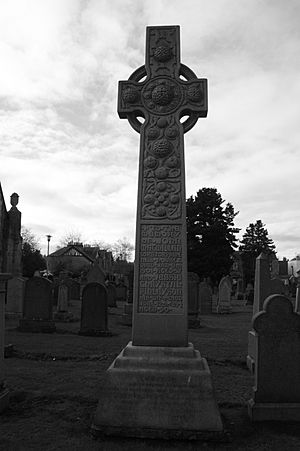Chrystal Macmillan facts for kids
Quick facts for kids
Chrystal Macmillan
|
|
|---|---|
 |
|
| Born |
Jessie Chrystal Macmillan
13 June 1872 Edinburgh, Scotland
|
| Died | 21 September 1937 (aged 65) Edinburgh, Scotland
|
| Resting place | Corstorphine, Edinburgh |
| Education | Mathematics, natural philosophy, moral philosophy, logic |
| Alma mater | University of Edinburgh |
| Occupation | politician, lawyer |
Jessie Chrystal Macmillan (born June 13, 1872 – died September 21, 1937) was an amazing Scottish woman. She fought for women's right to vote and for peace. She was a lawyer and a feminist.
Chrystal Macmillan was the first woman to graduate with a science degree from the University of Edinburgh. She was also the first woman there to get top honors in mathematics. She became the second woman ever to argue a case in front of the House of Lords in London. She also helped start the Women's International League for Peace and Freedom.
During World War I, Chrystal spoke for British women who wanted peace. She attended the International Congress of Women in The Hague. This meeting chose delegates to share their peace ideas with world leaders. Chrystal traveled to countries that were not fighting, like the United States. She met with leaders such as President Woodrow Wilson. Many of the ideas from the women's congress were later used by President Wilson in his famous "Fourteen Points" for peace. After the war, Chrystal helped organize another women's congress in Zurich. She also worked to support the creation of the League of Nations, an early version of the United Nations.
Contents
Early Life and Education
Jessie Chrystal Macmillan was born in Edinburgh, Scotland, on June 13, 1872. She was the only daughter among eight children. Her father, John Macmillan, was a tea merchant.
Chrystal went to school in Edinburgh and then to St Leonards School in St Andrews. In 1892, she was one of the first female students to join the University of Edinburgh. She studied science subjects like mathematics and astronomy. In 1896, she made history by becoming the first woman to graduate from the university with a science degree and top honors in mathematics.
After this, she studied more in Berlin, Germany. She then returned to Edinburgh to study arts, including politics. In 1900, she graduated again, earning high honors in moral philosophy and logic. While at university, she joined the Edinburgh Ladies' Debating Society. This helped her become confident in speaking and arguing. She also joined the Edinburgh Mathematical Society, becoming its second female member.
Fighting for Women's Rights
Chrystal Macmillan was very active in groups that fought for women's right to vote. She was part of the Edinburgh National Society for Women's Suffrage. This group later joined with others to form the National Union of Women's Suffrage Societies (NUWSS).
In 1906, Chrystal and other female graduates from Edinburgh University were not allowed to vote for the Member of Parliament representing the university. Chrystal argued that the voting rules used the word "persons," and women were indeed persons! She took her case to court, but she lost. Scottish women who supported voting rights raised money to take the case to the House of Lords, which is the highest court. They wanted to show how unfair it was to deny educated women the right to vote.
In November 1908, Chrystal Macmillan stood before the House of Lords in London. She was the first woman ever to argue a case there. She spoke for nearly an hour, explaining why women graduates should have the right to vote. Newspapers called her a "modern Portia," after a famous lawyer from Shakespeare's plays. Even though she lost the case, her appearance gained worldwide attention. This publicity was very important for the women's voting rights movement.
Chrystal spoke at many meetings. In 1909, she spoke alongside other important women like Elsie Inglis. She also worked with women from other countries to create a book called Woman Suffrage in Practice, 1913. This book described how women could vote (or not vote) in 35 different countries. Chrystal found that in most places, women were kept from voting by old customs, not by specific laws. From 1913, she served as a vice president for the International Woman Suffrage Alliance for ten years.
Working for Peace
When World War I started, Chrystal Macmillan wanted to work for peace. Many British women supported the war, but Chrystal believed in peace. She traveled to the Netherlands to help refugees from the war. She also signed the "Open Christmas Letter" in 1914, which was a message of peace from women in warring countries.
In 1915, an important meeting called the International Congress of Women was held in The Hague. Over 1,150 women from different countries came together to talk about how to bring peace. Chrystal was one of only three British women who could attend, as many others were stopped from traveling. At this congress, Chrystal was chosen to be part of a special committee. This committee traveled to neutral countries, like the United States, to share the women's peace ideas with leaders. They met with President Woodrow Wilson. Many of the peace ideas from the women's congress were later used by President Wilson in his famous "Fourteen Points" plan for peace. The women's efforts also helped lead to the creation of the League of Nations after the war.
After the war, Chrystal went to another International Congress of Women in Zurich in 1919. The women at this meeting thought the peace terms for Germany in the Treaty of Versailles were too harsh. Chrystal took their concerns to the leaders meeting in Paris, but the treaty was not changed.
Becoming a Lawyer
In 1918, women in Britain over 30 years old finally got the right to vote and hold public office. A new law in 1919 allowed women to become lawyers. Chrystal Macmillan then studied to become a barrister, which is a type of lawyer who argues cases in court. She officially became a barrister in 1924.
She worked on many cases, both defending people and prosecuting them. While studying law, she also helped start the Open Door Council. This group worked to remove old laws that limited women's opportunities. Chrystal believed that women should have equal chances in the workplace. In 1929, she co-founded a global group called the Open Door International for the Economic Emancipation of the Woman Worker. She led this group until she passed away.
Political Life and Women's Nationality
Chrystal Macmillan also tried to become a politician. In the 1935 general election, she ran as a candidate for the Liberal Party in Edinburgh North. She did not win, but she showed her dedication to public service.
She also worked with other women's rights activists. A writer named Cicely Hamilton said that Chrystal was a lawyer who believed that law should always mean justice. Her main goal was to make sure every woman, no matter where she came from, had the protection of justice.
Chrystal Macmillan strongly believed that women should have their own national citizenship, separate from their husbands. Before this, a woman's citizenship often changed to match her husband's when they married. This caused problems during World War I. For example, a woman born in Britain might suddenly become an "enemy national" if she was married to a man from a country that Britain was fighting.
Chrystal wrote about this issue, arguing that women should have the same right as men to keep or change their nationality. In 1930, she pushed for this change at an international conference. She organized a group called the International Committee for Action on the Nationality of Married Women. This group worked hard to convince the League of Nations to change the rules. Chrystal wanted to make sure a woman's nationality would not change without her permission. She also wanted children to be able to have dual citizenship if their parents had different nationalities.
Unfortunately, the League of Nations did not agree with Chrystal's ideas at that time. The old rules about women's nationality stayed in place.
Death and Legacy
Chrystal Macmillan's health began to fail in 1937. She passed away from heart disease on September 21, 1937, in Edinburgh. She was buried with her parents in Corstorphine churchyard.
In her will, she left money to the Open Door International, the group she led that fought for women's economic freedom. A beautiful stained glass window was placed in Old Corstorphine Church to remember her.
Chrystal Macmillan's work continues to be honored. The Honourable Society of the Middle Temple in London gives out the "Chrystal Macmillan Prize" to female law students. The University of Edinburgh, her old school, has named a building after her, the Chrystal Macmillan Building. It houses the School of Social and Political Science. There is also a plaque at the university's science campus that honors her as a suffragist, peace activist, and the first woman science graduate.
In 2021, the University of Edinburgh also started the Chrystal Macmillan PhD Studentship. This helps students who are studying topics important to Chrystal, like social justice, gender equality, and human rights.
Finally, in 1957, the United Nations made a rule that each married person has independent nationality. This was a goal Chrystal Macmillan worked towards for many years, and it finally became a reality after her death. Her name is also on the base of the statue of Millicent Fawcett in Parliament Square, London, which honors women who fought for voting rights.
Images for kids
-
International Congress of Women in 1915. From left to right: 1. Lucy Thoumaian – Armenia, 2. Leopoldine Kulka, 3. Laura Hughes – Canada, 4. Rosika Schwimmer – Hungary, 5. Anita Augspurg – Germany, 6. Jane Addams – U.S., 7. Eugenie Hamer, 8. Aletta Jacobs – Netherlands, 9. Chrystal Macmillan – UK, 10. Rosa Genoni – Italy, 11. Anna Kleman – Sweden, 12. Thora Daugaard – Denmark, 13. Louisa Keilhau – Norway
See also
 In Spanish: Chrystal Macmillan para niños
In Spanish: Chrystal Macmillan para niños
 | Laphonza Butler |
 | Daisy Bates |
 | Elizabeth Piper Ensley |





